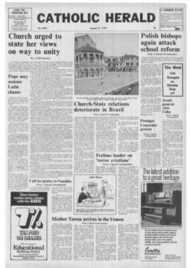Page 4, 31st August 1973
Page 4

Report an error
Noticed an error on this page?If you've noticed an error in this article please click here to report it.
Tags
Share
Related articles
In The Week When The Catholic Marriage Advisory Council...
A Divorce Revolution?
Strengthen Marriage This Way, Say Catholic Women Of Canada
Bishops Hit At Easier Divorce
Once Again, It Is Adam Vs Eve
Lawyers could do more to mend broken marriages
By Maureen Vincent
The idea of reconciliation in divorce actions was first introduced into English law by the Divorce Reform Act, 1969, which set out to do away with the ideas of "guilt" and "innocence" in divorce suits.
To some extent it has been successful in this, but unfortunately some of the ways in which a petitioner can show that his marriage has "irretrievably broken down" resemble all too closely the old grounds for divorce.
The Act specifically lays down that the solicitor acting for a petitioner in a divorce suit must certify whether he has discussed with his client the possibility of a reconciliation.
Many people may have hoped that this provision would lead to reconciliation attempts being made in every divorce suit; unfortunately, this is not what the law requires. The Act states clearly that the solicitor must certify whether he has discussed reconciliation.
Practice directions have made it quite clear that there is no duty laid upon lawyers to discuss the question in every case. What it boils down to is that this is, in fact, a matter for the individual lawyer's own discretion.
To find out how far, if at all, attempts are being made by solicitors to refer their clients to a suitable counselling agency so that at least an attempt can he made to straighten matters out before it is too late, I talked this week with Fr. Maurice O'Leary, director of the Catholic Marriage Advisory Council.
He explained: "Reconciliation was very• much the brainchild of Lord Symon, then President of the Probate, Divorce and Admiralty Division of the High Court. He wanted to try to take the really hurtful issues, especially the bitter fights over children of a broken marriage, right out of the Courts.
"He had quite a few meetings with people involved, like ourselves. Then, very unfortunately, the whole thing got It wtied ou would with b the been Divorce better i v o ree had
Act.
d have it wtied ou would with b the been Divorce better i v o ree had
Act.
d have it
been built up from within the legal profession, with the idea of making lawyers more sensitive.
"Now and then, but very rarely, does one come across a lawyer who will really exert himself on behalf of the marriage. There are no statistics. of course, but my impression is that on the whole the reconciliation provision in the Act has made very little difference in practice."
Fr. O'Leary feels that this may be partly because solicitors know very little about marriage counselling. "This is probably our own fault," he admits.
"But some judges, lord Symon in particular, seem to show great concern. Also the New Law Journal published a complete list of National Marriage Guidance and C.M.A.C. centres, so that
solicitors would he able to see the addresses of local centres. In some places there were meetings of local lawyers.
"This sort of thing is particularly helpful. When a solicitor has met a marriage guidance counsellor face to face he will have more confidence in referring clients to the counselling agency."
Fr. O'Leary emphasised that the reconciliation section of the Act was in no way mandatory upon lawyers. "It is up to the individual solicitor concerned to make a judgment: if he feels the situation is quite hopeless he can just leave it."
In his experience, says Ff. O'Leary, even when people have got to the point of consulting solicitors about divorce proceedings, in many cases there is still a chance for the marriage. His view has been backed recently in the protest about the lack of attention to reconciliation, made by Mr. N. Tyndall of the N.M.G. Council. "Sometimes people take the step of consulting a solicitor as a kind of cry for help. in order to make a gesture. At other times a person may be pushed into asking for legal advice, perhaps by a well-meaning friend or relation.
"Often, once an approach to the law has been made, it seems impossible to go back. A person can get into the hands of a clerk whose job is to make out the best possible case for a divorce suit."
Sometimes, added Fr. O'Leary, people were absolutely horrified and embarrassed that things said in the heat of a moment of hurt and bitterness could actually be read out in court in a divorce hearing.
He hopes that the new £25 Legal Aid fee may have a beneficial effect. "It could be that some of the more mechanical solicitors might be satisfied with listening to someone's story and perhaps giving a bit of commonsense advice, recognising that there will in any case be recompense for their trouble.
"They have got a lot to learn about counselling, but after all it isn't their job. I do strongly feel that there needs to be a development of sensitivity. I think that in the ordinary training of lawyers there should be a course of instruction on the ways in which people react when they are hurt and upset.
"Some lawyers, let me repeat, arc excellent. They can judge a situation and see to it that the horrible mechanical process does not take over. But this does demand time.
"In one case, for example, a solicitor asked me if she could meet me here at the Centre (in Lansdowne Road,. West London), with both husband and wife present, so that we could have an exploratory discussion. This is the kind of concern which I should, ideally, like to see being demonstrated by every lawyer who deals with divorce actions."
blog comments powered by Disqus









